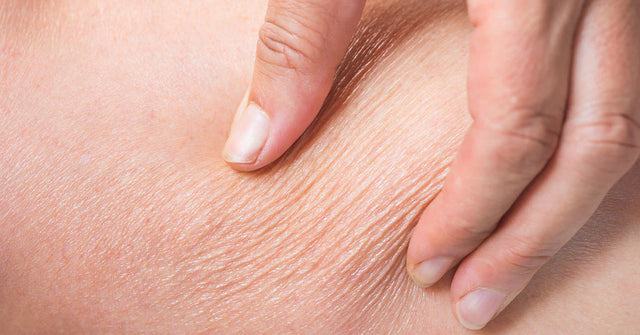During menopause, shifts in estrogen and progesterone levels can lead to several body changes, including a decline in skin health. You may experience dryness, acne, facial hairs, and a lack of plumpness leading to wrinkles and lines due to menopause and hormones.
While the impact of changing estrogen and progesterone levels on your skin may cause you stress and affect your confidence, there are many things you can do to improve the health, clarity, and youthfulness of your complexion during this time in your life.
In this article, we’ll explore the possible changes to your skin which may occur during menopause and offer some lifestyle and medical solutions to improve the health and vigor of your complexion.
How Does Your Skin Change as You Mature?
While young skin is often healthy, hydrated, plump, and free of signs of age, as you get older, your skin health can decline. Collagen and elastin levels, which give the skin its firmness and flexibility, decrease naturally, which could cause sagging and lead to wrinkles and fine lines.
At the same time, the skin becomes thinner and more vulnerable over time, making it harder to keep hydrated. Hyaluronic acid levels decrease naturally, and factors like overexposure to UV rays can also contribute to dry, flaky skin. A consistent daily anti-aging skincare routine can do a lot to keep your skin in good condition as you age.
How Does Estrogen Change Your Skin?
When menopause hits and estrogen declines, it leads to a significant drop in collagen and elastin levels, looser, saggy skin, and visible signs of aging, like wrinkles. Loss of estrogen also impacts the skin’s ability to hold onto moisture and produce oil, which could lead to a dry, flaky complexion.
Although the sebaceous glands generally slow oil production when estrogen drops, some women find the opposite and have excess oil, which could lead to acne and breakouts during menopause.
Common Menopause Changes
Several common skin changes could occur during menopause, and we’ll examine them individually to give you an idea of what you may expect. Remember that these issues are not complicated, and we’ll explain how to deal with them later in this article.
Dryness, Flakiness, and Itching
Decreasing levels of hormones during menopause, and in particular estrogen, harm your skin’s ability to stay hydrated. The skin becomes thinner and less plump, which makes it less likely to retain moisture. It may also slow oil production, leading to a dry, flaky, itchy complexion. You may also notice this on other areas of your body besides the face, like on your elbows and knees.
Sagging Skin
One of the primary reasons the skin becomes saggy during menopause is the decline in collagen and elastin levels. During your younger years, these proteins made your skin firm and elastic. Thus, their loss can cause sagging skin on the face and neck and signs of age like wrinkles and fine lines.
Facial Hairs
Other possible changes related to estrogen and skin health include facial hairs, especially on your chin and above your lip. This occurs because testosterone levels stay the same during menopause while estrogen drops and the shift in hormone balance could cause some secondary male sex characteristics to develop.
Age and Dark Spots
Changes in hormone levels during menopause can cause melasma, characterized by dark spots and hyperpigmentation on the forehead, cheeks, and upper lip. Exposure to UV rays over time can add to this problem, and using sun protection can prevent it from getting worse.
Thinning Hair
Among the changes related to menopause and hormones, levels of estrogen decline can cause your hair to become thinner and shed more. Estrogen promotes the growth and thickness of the hair, so the sudden drop during menopause can impact the health of both the hair and the scalp. It may cause your scalp to dry out due to moisture loss, and any exposed or thin areas are vulnerable to further damage from UV rays.
Acne Breakouts
A decrease in estrogen usually leads to less oil production from the sebaceous glands, drying out the skin. While there wouldn’t seem to be a link between acne and menopause, hormonal imbalance may cause an overproduction of oil in some women leading to acne and breakouts.
Taking Care of Your Skin During Your Menopause
If you are experiencing some of the changes in your skin that we have described or are concerned that you will, you should know that there are lifestyle and medical solutions to help restore and rejuvenate your complexion.
Following a Healthy Skincare Routine
For optimal health, you should follow a consistent morning and evening skin routine. However, during menopause, it’s important to implement an even more powerful anti-aging regimen to combat the new changes.
Along with cleansing and toning, choose a powerful hydrating moisturizer with ingredients like hyaluronic acid and ceramides to plump your skin and eliminate dryness.
You should include an anti-aging serum or cream with collagen-boosting ingredients to tighten the complexion and help smooth wrinkles and fine lines. Add Eyevage to your daily skincare routine to address the issues like crow’s feet, bags, and dark circles. We also offer a rich collection of anti-aging options which deal with all of these concerns.
Remember to exfoliate a few times a week to remove dead skin cells, dirt, and oils in your pores and decrease the likelihood of acne breakouts.
Control Your Diet
During menopause, as always, it’s important to follow a healthy diet high in whole grains, fruits, leafy greens, nuts and seeds, dairy, and lean meats. Foods high in antioxidants, like berries, spinach, and potatoes, promote repair and healing and offer anti-aging properties.
In addition, include plenty of healthy fats to keep up your hydration. Avoid refined sugars and processed foods which could break down collagen and elastin and contribute to further skin aging.
We also advise you to include some foods with natural phytoestrogens. These are plant compounds that help naturally raise estrogen levels. Some include soybeans, grapes, flaxseed, chickpeas, peanuts, and plums.
Manage Your Stress
Stress can harm the skin as it raises levels of hormones like cortisol, increasing oil production and causing acne breakouts. It could also exacerbate skin conditions like eczema and psoriasis. Stress also impacts the skin’s ability to retain moisture, which can cause dryness.
To limit the effects of stress on your complexion during menopause, work on lowering your levels through techniques like yoga, meditation and mindfulness, counseling, and promoting a better life-work balance.
Visiting Your Dermatologist
If you’re experiencing menopause skin concerns, visit your dermatologist for additional treatment is a good idea. They may suggest clinical treatments such as microdermabrasion or laser therapy which could stimulate the production of collagen and elastin to tighten the skin, as well as products that are more powerful than over-the-counter skin care.
FAQ
What happens to your skin when estrogen is low?
During menopause, your estrogen levels drop, which leads to a decline in collagen and elastin levels. This reduces tightness and loosens the skin, which may cause sagging, wrinkles, and fine lines.
Low estrogen also dries the skin by reducing moisture retention and slowing oil production for a dry, flaky complexion. In some women, it causes oil overproduction leading to acne and breakouts.
Key Takeaways
If you’re in menopause, you may have noticed changes in your skin, such as sagging, facial hair, dryness, dark spots, and even acne. While some women may be upset by these issues, there are some lifestyle and dermatological solutions to ensure your skin stays healthy, plump, glowing, and youthful.
Look through our collection of powerful anti-aging and skin health products and build an effective routine to take you through the menopause years and beyond. Our line helps keep the skin hydrated, eliminates dark spots, and provides added collagen and elastin for tighter, younger-looking skin.
Mentioned in this article
More stories

Signs of Dehydration in Your Skin







